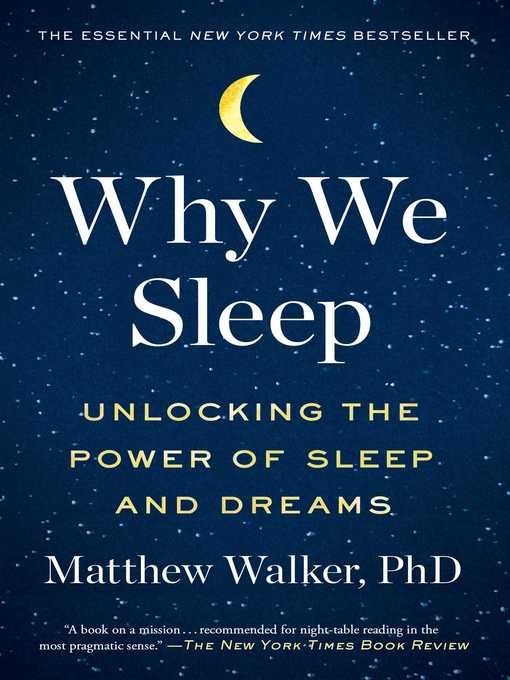
Why We Sleep
Unlocking the Power of Sleep and Dreams
کتاب های مرتبط
- اطلاعات
- نقد و بررسی
- دیدگاه کاربران
نقد و بررسی

July 1, 2017
Why do we sleep? Walker (neuroscience & psychology, Univ. of California Berkeley) draws from 20 years of sleep research, which demonstrates that sleep provides a plethora of benefits, both mental and physical, to the entire body. He discusses the biology of sleep, the dangers of sleep deprivation, why we dream, and sleep disorders. The author laments the organizational culture that equates sleeplessness with productivity, and demonstrates the fallacy of that belief. He emphasizes the importance of sleep to the developing brains of children and teenagers, and why early school start times are harming high school students physically and academically. He also explains that if all of the benefits that sleep bestows could be formatted into a pill, no one would hesitate to take it; but the benefits are available to all of us for free. The book closes with a discussion of personal, organizational, and societal practices that would greatly benefit health, productivity, creativity, and longevity. Walker is a scientist but writes for the layperson, illustrating tricky concepts with easily grasped analogies. VERDICT Of particular interest to business owners, educators, parents, and government officials, and anyone who has ever suffered from a poor night's sleep.--Rachel Owens, Daytona State Coll. Lib., FL
Copyright 2017 Library Journal, LLC Used with permission.

August 21, 2017
Walker, a professor of neuroscience and psychology at UC Berkeley, begins his first book by reminding readers that until quite recently, the routine that most of us go through nightly was a mystery. Adopting a conversational style that belies his research background, Walker conveys his insights into the process of sleep with enthralling clarity. He recounts how once, after giving a lecture, he was approached by a pianist, who made the seemingly incidental remark that, after a good night’s sleep he can “just play” even demanding pieces, leading Walker to recognize how closely related learning is to rest. He also sheds new light on well-covered areas, revealing that Freud had developed a more biologically founded approach to dreams before formulating his famous theory. The biggest takeaway is not that lack of sleep can literally kill, but that most of us, without being in mortal danger, are still not getting nearly enough. Anyone who reads this book will (though perhaps only after a good night’s sleep) learn a great deal about one of life’s most basic, but also most profound, needs. Agent: Tina Bennett, William Morris Endeavor.

September 1, 2017
Revelations about sleep that illustrate its vital importance to our brains, our bodies, and our lives.The director of the Sleep and Neuroimaging Lab at the University of California, Walker has spent decades researching sleep and has served as a consultant to sports teams, financial institutions, and TV producers. In other words, he is an expert, but more importantly, he knows how to explain it all clearly to general readers. He begins by showing what sleep is and what it isn't, how other creatures sleep, and how it changes across a lifetime. In Part 2, he examines the numerous benefits of sleep and how it affects mental and physical health, such as the ability to learn and the fitness of the gut and the cardiovascular and immune systems. So important is sleep to our well-being that Walker counsels that the shorter one's sleep, the shorter one's life span. In Part 3, which peers into the brains of people dreaming, Walker provides examples of the sometimes-astonishing creativity and problem-solving power of dreams. This section also tackles the phenomenon of lucid dreams--i.e., dreams controlled by the dreamer. In Part 4, the author takes up sleep disorders and the harmful effects of sleep deprivation, not just to the individual, but to society. Walker counsels against sleeping pills and offers nondrug therapies that he has found to be effective. In the concluding chapter, "A New Vision for Sleep in the 21st Century," the author outlines his proposals for enhancing sleep quantity and quality: individual use of new technology, sleep education in schools, sleep reform in the workplace, public campaigns to heighten awareness of the hazards of drowsy driving, and, more elusive, societal change in sleep awareness. Readers, he cordially advises, may read the parts in any order they prefer and close their eyes and take a nap if they feel like it. Though readers seeking dream interpretation will be disappointed, Walker provides a well-organized, highly accessible, up-to-date report on sleep and its crucial role in a healthy life.
COPYRIGHT(2017) Kirkus Reviews, ALL RIGHTS RESERVED.

























دیدگاه کاربران